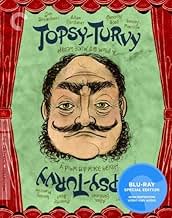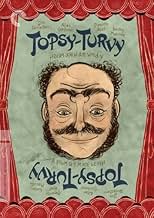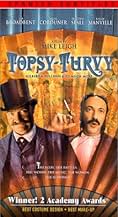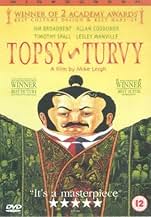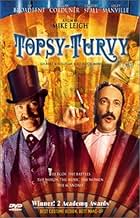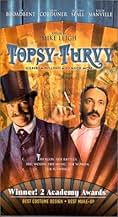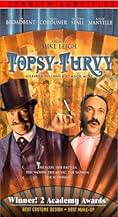CALIFICACIÓN DE IMDb
7.3/10
14 k
TU CALIFICACIÓN
En los 1880, Gilbert y Sullivan, famosos escritores de teatro musical, enfrentan una crisis creativa que amenaza su colaboración. Justo cuando parece que todo está perdido, encuentran inspir... Leer todoEn los 1880, Gilbert y Sullivan, famosos escritores de teatro musical, enfrentan una crisis creativa que amenaza su colaboración. Justo cuando parece que todo está perdido, encuentran inspiración para crear su obra maestra: El Mikado.En los 1880, Gilbert y Sullivan, famosos escritores de teatro musical, enfrentan una crisis creativa que amenaza su colaboración. Justo cuando parece que todo está perdido, encuentran inspiración para crear su obra maestra: El Mikado.
- Dirección
- Guionista
- Elenco
- Ganó 2 premios Óscar
- 13 premios ganados y 28 nominaciones en total
Bill Neenan
- Cook
- (as William Neenan)
- Dirección
- Guionista
- Todo el elenco y el equipo
- Producción, taquilla y más en IMDbPro
Opiniones destacadas
Gilbert and Sullivan are a successful musical team writing their shows for the Savoy Hotel in London. However Sullivan is tired and is suffering from ill-health. During a bad bout he resolves to no longer write for the Savoy with Gilbert but instead to recover in France and then to strike out alone and write a grand opera. Gilbert meanwhile, is showing signs of fatigue coming up with plots that use the same devices to the same ends. However the two are contractually obliged to continue their relationship, a prospect both seem ill at ease with until Gilbert takes an afternoon off at an exhibition of Japanese culture, sowing the seeds of inspiration for The Mikado.
I honestly had never even heard of this film until the television premier in 2002, if you had told me Mike Leigh had made a film on such subject matter I would likely have laughed down my sleeve at such a suggestion. However I gave this a watch despite the fact I know little (or care little) for the works of Gilbert and Sullivan and worries bout the fact it was 160 odd minutes long! However the plot is sufficiently well delivered to take those who only know a little about the pair to keep up. By taking the snapshot of the Mikado to show their relationship the film takes away what could have been a rough, sprawling epic the snapshot works much better. The weaving of the production into the narrative, rather than all at the end, means that both sets of fans will be happy there is enough music to please those who came for that, but also enough plot within to drive the film.
Leigh does very well, mixing humour and telling drama with the music of the show. The production of the film (and the production!) are both very good and the detail is fine. The cast are all excellent. Broadbent is good as the straight-laced Gilbert and his chemistry with the enjoyable Corduner works throughout. The support cast are all good in singing and non-singing scenes I was surprised to see Spall carrying the tunes so well!
Overall this is a good film but I doubt that Gilbert & Sullivan will be much of a draw even now that it is on TV. However if you have the chance to watch it then you should push through your reservations and give it a try it is engaging and humourous enough to overcome a lack of knowledge (or interest) in the pair's work.
I honestly had never even heard of this film until the television premier in 2002, if you had told me Mike Leigh had made a film on such subject matter I would likely have laughed down my sleeve at such a suggestion. However I gave this a watch despite the fact I know little (or care little) for the works of Gilbert and Sullivan and worries bout the fact it was 160 odd minutes long! However the plot is sufficiently well delivered to take those who only know a little about the pair to keep up. By taking the snapshot of the Mikado to show their relationship the film takes away what could have been a rough, sprawling epic the snapshot works much better. The weaving of the production into the narrative, rather than all at the end, means that both sets of fans will be happy there is enough music to please those who came for that, but also enough plot within to drive the film.
Leigh does very well, mixing humour and telling drama with the music of the show. The production of the film (and the production!) are both very good and the detail is fine. The cast are all excellent. Broadbent is good as the straight-laced Gilbert and his chemistry with the enjoyable Corduner works throughout. The support cast are all good in singing and non-singing scenes I was surprised to see Spall carrying the tunes so well!
Overall this is a good film but I doubt that Gilbert & Sullivan will be much of a draw even now that it is on TV. However if you have the chance to watch it then you should push through your reservations and give it a try it is engaging and humourous enough to overcome a lack of knowledge (or interest) in the pair's work.
10Fab4Fan
TOPSY-TURVY, director Leigh's spectacularly entertaining look at the lives and times of the nineteenth-century British duo that gave the world such musical treasures as The Pirates of Penzance and HMS Pinafore. Leigh's film finds G & S in 1884 at a creative impasse following the disappointing reception of their new flop operetta, Princess Ida. Sullivan (Allan Corduner), tired of writing music for the increasingly trite and repetitive librettos of Gilbert (Jim Broadbent), wants to give up their lucrative partnership and write "serious" grand opera. But when an exhibition of Japanese art and culture travelling through London inspires Gilbert to begin writing The Mikado, both men see the opportunity to create something unique and extraordinary. Praise for this stunning film must extend from top to bottom, beginning to end. The music, of course, is wonderful and ever present. The costumes, sets and cinematography are exemplary in their attention to atmosphere and detail. Leigh's script and direction not only bring the period to life, but make it crackle with drama, wit, and social comment. And the performances are fabulous, notably the magnificent Broadbent as mercurial Gilbert; Corduner, warm and charming as the more sweet-natured Sullivan; and Leigh regular Timothy Spall (SECRETS & LIES) as a veteran actor fearful that his big number may be cut. This is quite simply one of the most vastly entertaining, joyous and fascinating films ever made about the creative process. I actually saw it twice within a three-day period and wasn't bored for one second of either viewing!
Not being a big fan of opera (of the comedic variety or otherwise), I chose to watch this movie as a period piece, hoping to see a lot of eccentric characters putting on even more eccentric theatre. That was easy, since the trailer for the film points in that direction entirely.
What I didn't expect was a thoroughly entrancing inside view of the Victorian theatre. Not to mention comprehensive. Everyone is covered in this - from the stage boy through the chorus through the leads and producers and assistant directors. The telling of the complex relationships between the directors (Gilbert and Sullivan) and the leads is particularly poignant - whether dealing with the actors' considerable egos or their individual popularity among the chorus, nothing presented doesn't ring true.
I loved everything about this movie. It's a great story, told wonderfully by all involved. It is truly a film of much love and craft.
And I expect I'll be attending the next run of the Mikado next time it comes to town.
What I didn't expect was a thoroughly entrancing inside view of the Victorian theatre. Not to mention comprehensive. Everyone is covered in this - from the stage boy through the chorus through the leads and producers and assistant directors. The telling of the complex relationships between the directors (Gilbert and Sullivan) and the leads is particularly poignant - whether dealing with the actors' considerable egos or their individual popularity among the chorus, nothing presented doesn't ring true.
I loved everything about this movie. It's a great story, told wonderfully by all involved. It is truly a film of much love and craft.
And I expect I'll be attending the next run of the Mikado next time it comes to town.
Much has been said here regarding the brilliant costumes, art direction and acting. The one thing I would like to point out is the misconception many have had about the script itself.
Several comments here have claimed that the film is "clunky" in that several scenes apparently added nothing to the film. They also said there was no character development. I think these people need to realize that the depth they seek is contained in the very scenes they wished excised. Which show us all of the different aspects of these characters' lives.
While appearing to be unimportant, empty or simple these many scenes reveal incalculable depth and character insight. The rehearsal scene for just one example, while seeming initially to be a little comedic scene shows us the nature and attitude of both the author and the actors involved in their creative processes.
The performance scenes are also not superfluous as some have wrongly asserted. We can see the characters we have come to know and how they deal onstage with the problems we know they have in their lives: through expressing themselves in their art!!!
In addition the scenes are not arbitrarily strung together but all contain a subtle cause and effect throughline. Sometimes these are reversed as when a cause is revealed only after we have repeatedly seen the effect (as in the revelation of Grossman's illness). Many of the scenes which people have called "tacked on" at the end (like the stunning scene between Gilbert and his wife Kitty) are in fact set up in the earlier parts of the film if you pay close attention and are in actuality a natural progression of these relationships.
Even the very last scene when the leading lady sings is there to show us her identification with the song she is singing and therefore an indirect relationship with her lyricist and composer. This film needs to be seen more than once to appreciate how well constructed it truly is
Several comments here have claimed that the film is "clunky" in that several scenes apparently added nothing to the film. They also said there was no character development. I think these people need to realize that the depth they seek is contained in the very scenes they wished excised. Which show us all of the different aspects of these characters' lives.
While appearing to be unimportant, empty or simple these many scenes reveal incalculable depth and character insight. The rehearsal scene for just one example, while seeming initially to be a little comedic scene shows us the nature and attitude of both the author and the actors involved in their creative processes.
The performance scenes are also not superfluous as some have wrongly asserted. We can see the characters we have come to know and how they deal onstage with the problems we know they have in their lives: through expressing themselves in their art!!!
In addition the scenes are not arbitrarily strung together but all contain a subtle cause and effect throughline. Sometimes these are reversed as when a cause is revealed only after we have repeatedly seen the effect (as in the revelation of Grossman's illness). Many of the scenes which people have called "tacked on" at the end (like the stunning scene between Gilbert and his wife Kitty) are in fact set up in the earlier parts of the film if you pay close attention and are in actuality a natural progression of these relationships.
Even the very last scene when the leading lady sings is there to show us her identification with the song she is singing and therefore an indirect relationship with her lyricist and composer. This film needs to be seen more than once to appreciate how well constructed it truly is
Mike Leigh's gloriously entertaining film, `Topsy-Turvy,' offers a wise and witty slice of musical theater history. Set in 1880's London, the movie chronicles the extraordinary personal and professional relationship between two giants of the 19th Century entertainment world, lyricist `Willie' Gilbert and composer Arthur Sullivan. The screenplay, wisely, chooses to pick up the tale not at the very beginning of their collaborative career - tracing its rise and fall as many biopics would do - but rather at the point where the team has already garnered international fame and success but seems of late to be experiencing a bit of creative stagnation. Sullivan, tiring of the seemingly trivial nature of the librettos they've been producing, wants to break away and embark on his own to produce a work of more `weighty' merit. Gilbert, on the other hand, delights in his success and, although bothered by comments in the press that his work has begun to repeat itself, initially resists Sullivan's plea that they abandon their hitherto winning formula.
Thus, the conflict between the two men of creative genius plays itself out against the fascinating backdrop of a deliciously recreated vision of the theatrical world of a hundred-odd years ago. Just as important to the film as the two main characters is the rich assortment of secondary players - theater proprietors, company actors, wives, lovers and parents - who swirl around the principals and provide a colorful tapestry to match the exquisite art direction and costuming that adorn the film. In addition, Leigh incorporates clever references to some of the technological marvels just making their appearance at the time: telephones, reservoir pens and luxury hotels with baths for every room!
Leigh's pacing is admirably unhurried and relaxed. So rich is the detail of his vision that fully thirty-five minutes elapse before the two lead characters even have their first scene together. In addition, the inspiration for `The Mikado' - ostensibly the centerpiece of the film's plot - doesn't strike Gilbert until well into the second hour. Yet, the film never falters in interest, least of all when Leigh devotes long stretches of footage to showing us the actors rehearsing their parts or having us eavesdrop on some behind-the-scenes salary negotiations or discussions of artistic differences. This is the real triumph of the film: Leigh opens up a world to us by letting us see the fascinating nuts-and-bolts aspects of the creative process to which we, as members of a theatre audience, are rarely privy. He also is not afraid to linger long over many a beautiful reproduction of the musical pieces themselves. Leigh can count his film a success in that it makes us want to rush out and catch a performance of one of these operettas ourselves.
The film would not be the splendid success it is were it not for the dazzling performances of its amazingly large cast. Jim Broadbent and Allan Corduner are perfection as the good-natured but often antagonistic partners, never playing the humor too broadly or violating the spirit of elite British gentility even in their most conflict-laden moments.
Indeed, it is this very quality of quiet subtlety that permeates every aspect of `Topsy-Turvy' and that makes it the wholly satisfying and entertaining film it is.
Thus, the conflict between the two men of creative genius plays itself out against the fascinating backdrop of a deliciously recreated vision of the theatrical world of a hundred-odd years ago. Just as important to the film as the two main characters is the rich assortment of secondary players - theater proprietors, company actors, wives, lovers and parents - who swirl around the principals and provide a colorful tapestry to match the exquisite art direction and costuming that adorn the film. In addition, Leigh incorporates clever references to some of the technological marvels just making their appearance at the time: telephones, reservoir pens and luxury hotels with baths for every room!
Leigh's pacing is admirably unhurried and relaxed. So rich is the detail of his vision that fully thirty-five minutes elapse before the two lead characters even have their first scene together. In addition, the inspiration for `The Mikado' - ostensibly the centerpiece of the film's plot - doesn't strike Gilbert until well into the second hour. Yet, the film never falters in interest, least of all when Leigh devotes long stretches of footage to showing us the actors rehearsing their parts or having us eavesdrop on some behind-the-scenes salary negotiations or discussions of artistic differences. This is the real triumph of the film: Leigh opens up a world to us by letting us see the fascinating nuts-and-bolts aspects of the creative process to which we, as members of a theatre audience, are rarely privy. He also is not afraid to linger long over many a beautiful reproduction of the musical pieces themselves. Leigh can count his film a success in that it makes us want to rush out and catch a performance of one of these operettas ourselves.
The film would not be the splendid success it is were it not for the dazzling performances of its amazingly large cast. Jim Broadbent and Allan Corduner are perfection as the good-natured but often antagonistic partners, never playing the humor too broadly or violating the spirit of elite British gentility even in their most conflict-laden moments.
Indeed, it is this very quality of quiet subtlety that permeates every aspect of `Topsy-Turvy' and that makes it the wholly satisfying and entertaining film it is.
¿Sabías que…?
- TriviaNot only did all the actors do their own singing, but everyone in the cast, including the pit orchestra and the actors who play instruments in the film, actually played the music they are seen to play.
- ErroresThis well known quote from the film is a factual mistake: "If you wish to write a Grand Opera about a prostitute, dying of consumption in a garret, I suggest you contact Mr Ibsen in Oslo. I am sure he will be able to furnish you with something suitably dull". The city of Oslo got the name in 1925 - a long time after Ibsen's death in 1906. During Ibsen's lifetime, the capital of Norway was called Kristiania.
- Citas
Helen Lenoir: The more I see of men, the more I admire dogs.
- Créditos curiososThe credit for "Location Vehicles" is misspelled "Location Vechicles".
- Bandas sonorasIf You Give Me Your Attention
from "Princess Ida"
Music by Arthur Sullivan
Lyrics by W.S. Gilbert
Performed by Martin Savage and Chorus
Selecciones populares
Inicia sesión para calificar y agrega a la lista de videos para obtener recomendaciones personalizadas
- How long is Topsy-Turvy?Con tecnología de Alexa
- What is the name of the musical piece that starts the scene where Barrington, Grossmith, and Lely are having lunch, just after Gilbert says "Enter Poo-Bah"?Siri keeps getting it wrong and the piece does not appear to be listed anywhere.
- What was the repeated word Sullivan offered as final advice to the cast?
- Was Gilbert really that distant and cold with his wife?
Detalles
- Fecha de lanzamiento
- Países de origen
- Idiomas
- También se conoce como
- Mike Leigh Untitled
- Locaciones de filmación
- Richmond Theatre, 1 Little Green, Richmond, Greater London, Inglaterra, Reino Unido(Savoy Theatre, London, England, UK)
- Productoras
- Ver más créditos de la compañía en IMDbPro
Taquilla
- Presupuesto
- GBP 10,000,000 (estimado)
- Total en EE. UU. y Canadá
- USD 6,208,548
- Fin de semana de estreno en EE. UU. y Canadá
- USD 31,387
- 19 dic 1999
- Total a nivel mundial
- USD 7,804,439
- Tiempo de ejecución2 horas 40 minutos
- Color
- Mezcla de sonido
- Relación de aspecto
- 1.66 : 1
Contribuir a esta página
Sugiere una edición o agrega el contenido que falta

Principales brechas de datos
By what name was Topsy-Turvy (1999) officially released in India in English?
Responda


